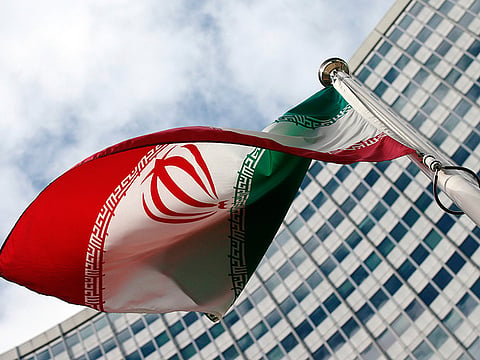Iran is a new colonial power
Iranian successes in colonising Iraq, Syria, Lebanon and Yemen overlooked the fact that all four countries were mired in perpetual conflicts

When Eric Rouleau, the last of the “great journalists” who truly understood the Muslim world, passed away a few days ago, it was not unusual for those who knew him to remember his significant prognostications. Rouleau, who was born and grew-up in Egypt before a weakling King Farouk stripped him of his citizenship in 1951, was a believer in Arab nationalism. He defended it in his native country, in Palestine and elsewhere, worrying that foreign usurpers would almost always perceive Arabs as unworthy of genuine independence. He feared that western colonialism would be replaced by similar quests that, in hindsight, proved an accurate reading of what developed.
A careful witness of the many wars and revolutions that scarred this part of the world for much of the 20th century, Rouleau conversed with most of the leaders who governed or ruled during the second part of the 20th century, ranging the gamut from Jamal Abdul Nasser to Ayatollah Khomeini. He wrote for Le Monde, and once told me that the Muslim world was destined for catastrophe in the aftermath of the 1979 Iranian Revolution, “because the mullahs were determined to return to their cherished 14th century”. After he completed his tour of duty as French Ambassador to Ankara, he reminded me that Turkey faced a similar conundrum because its leaders were caught in a contradictory dilemma: “reform in preparation for accession to the European Union or adopt more rigid visions of Ottomanism that also looked back”. In an exceptional article entitled Turkey’s Dream of Democracy, published in the November 2000 issue of Foreign Affairs, he described what ailed successive Turkish leaders, civilian and military alike, asserting that the “rigid nationalist ideology” created “a kind of shadow government through which the pashas [generals] can impose their will on parliament and the government”.
Whether Rouleau foresaw the rise of the latest colonial power in the Muslim world was not entirely clear, although recent Iranian bravura would not have come as a surprise. Ali Riza Zakani, a member of the Iranian Majlis, declared a few months ago that “three Arab capitals [Baghdad, Beirut, and Damascus], have already fallen into Iran’s hands and belong[ed] to the Iranian Islamic Revolution”, a particularly troubling assumption. This was the kind of hubris that put a smile on Rouleau’s face, and while few seem to be bothered by the rise of Iranian colonialism over the Arab world, the erudite journalist/diplomat knew better since he anticipated strong responses.
Indeed, with the addition of the fourth Arab capital, Sana’a, under Iranian colonial rule, the Muslim world in general and the Arab world in particular, were not out of the woods. In Iraq and Syria, the Iranian Revolutionary Guard Corps under the command of Qasim Sulaimani, deployed the infamous Quds Force militia that fought alongside the Nouri Al Maliki and Bashar Al Assad regimes. Yemen, of course, was exponentially different because of its strategic location on the Arabian Peninsula even if Zakani believed that Sana’a constituted “a natural extension of the Iranian Revolution”. Emboldened by pro-Iranian Al Houthis, he alerted everyone that this takeover would not be confined to Yemen but would permeate deeply into the Kingdom of Saudi Arabia. Less than three weeks before the September 21, 2014 Al Houthis gains in Sana’a, Hussain Shariatmadari wrote in the Iranian daily Kayhan: “The Islamic revolution underway in Yemen is an exalted and unrestrainable move that will lead to the collapse of the Al Saud regime and remove from this medieval regime — which has since its inception operated as a regional base for the forces of the arrogance [i.e. the West, led by the US] — the imposed puppet rule of the dictatorial Al Saud family.”
While this Kayhan nugget of unadulterated drivel was penned on September 6, 2014, it was not isolated. Ali Akbar Velayati, the former Iranian foreign minister and current adviser on international affairs to Supreme Leader Ali Khamenei, exhilarated visiting Yemeni clerics when he told them: “The Islamic Republic of Iran supports the rightful struggles of Ansar Allah [Al Houthis] in Yemen and considers this movement as part of the successful materialisation of the Islamic Awakening [the name Iran adopted for the ‘Arab Spring’] movements.” He added that he anticipated the Al Houthis would play a similar role to the one Hezbollah plays in Lebanon, which was a clear illustration of what Tehran expected from its satrapies. Without blinking, Velayati pontificated: “the road to free Palestine passed from Yemen since [the latter] had a strategic location and was near the Indian Ocean, Gulf of Oman and Bab Al Mandeb.” Rouleau heard similar pronouncements about geographic detours and was always amazed at the ease with which such avowals were made throughout the Muslim world.
For now, Iran’s colonial activities rode Arab weaknesses, although some leaders — led by King Salman Bin Abdul Aziz Al Saud — concluded that the fall of Sana’a (the fourth Arab capital in Iran’s hands) constituted a “clear and present danger”. That was why the Saudi monarch coordinated with Egyptian President Abdul Fattah Al Sissi, as the latter proposed the creation of a joint Arab force to counter security threats, even if it was not clear whether such a force would built on the Gulf Cooperation Council’s existing Peninsula Shield. Beyond this long overdue initiative, what was truly ironic was the fact that Iranian successes in colonising Iraq, Syria, Lebanon, and Yemen overlooked the fact that all four countries were mired in perpetual conflicts, with no prospects for security and prosperity. Neither for themselves nor for the nascent colonial power. Eric Rouleau foresaw that too and lamented that a return to the 14th century would not be cost free.
Dr Joseph A. Kechichian is the author of the forthcoming Iffat Al Thunayan: An Arabian Queen, London: Sussex Academic Press, 2015.


